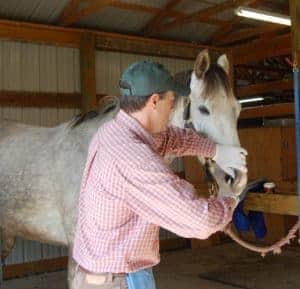
Equine Wolf Teeth
While these teeth usually don’t pose a health risk to the horse, they are often removed in performance horses.

While these teeth usually don’t pose a health risk to the horse, they are often removed in performance horses.

Preparing ahead for equine evacuations can be crucial to horses’ survival. Here’s what to remember.

The best fencing to use is dependent on several factors including the size of the property, number of horses, and more.

There are ways of preventing and treating equine lameness to help your horse be as healthy as possible.

One of the most alarming infectious diseases in the equine industry is strangles.
Researchers have identified and are studying a gene mutation linked to altered gait in horses.

Protect horses by vaccinating against the disease and taking measures to prevent mosquito bites.
With summer and fly season in full swing, horse owners should learn about pigeon fever.
Use topical fly repellent, fly sheets, and other tactics to protect horses from flies and related diseases.
Many owners keep horses stalled during storms, but turning horses out to pastures might keep them safer.
Taking certain steps during autumn months can help ensure your horse maintains his good health.
Before welcoming a new horse home, it is important to investigate the quality and health of that animal.

For riding enthusiasts, summertime necessitates paying extra attention to your horse’s physical needs.
Sweet itch is one of several seasonal allergies that a horse might encounter.
Around 150 pony clubbers from the Rio Grande, Texas, region visited the Texas A&M College of Veterinary Medicine & Biomedical Sciences (CVM) on Jan. 15, “Aggie Day”, to advance their Pony Club ranks and learn to become responsible horse owners. The
The American Veterinary Epidemiology Society recognized Noah Cohen, VMD, MPH, PhD, Dipl. ACVIM, professor of Large Animal Clinical Sciences at Texas A&M University’s College of Veterinary Medicine & Biomedical Sciences (CVM), as an
Stay on top of the most recent Horse Health news with
© 2022 Copyright Statement dolor sit amet, consetetur sadipscing User Terms, sed diam nonumy eirmod tempor invidunt ut labore et dolore magna aliquyam erat, sed diam voluptua. At vero eos et accusam et justo duo dolores et ea rebum. Stet clita kasd gubergren, no sea takimata sanctus est Lorem ipsum dolor sit amet.